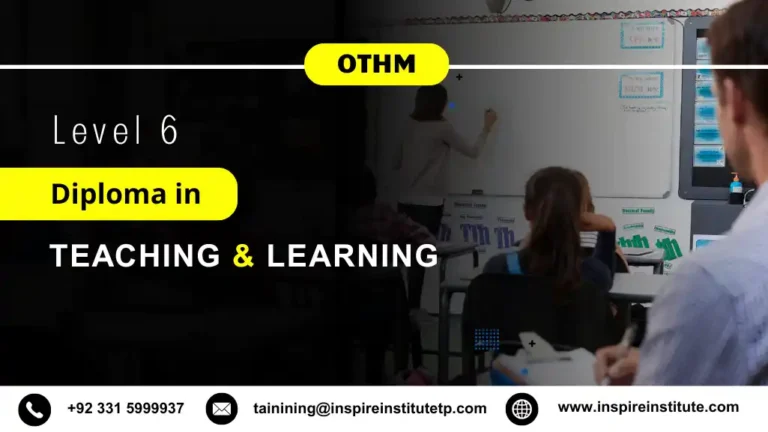OTHM Level 7 International Diploma in Process Safety Management (PSM)
The OTHM Level 7 International Diploma in Process Safety Management (PSM) is a comprehensive qualification designed for senior professionals aiming to enhance their expertise in managing process safety within complex industrial environments. This advanced program focuses on risk management, safety regulations, and the technical aspects of process safety, preparing individuals to effectively prevent, manage, and mitigate safety incidents. It is ideal for those seeking to advance their careers in industries such as chemical, petrochemical, oil and gas, and manufacturing, offering practical knowledge and skills needed to maintain a safe and compliant operational environment.
Why Choose this Qualification
Choosing the OTHM Level 7 International Diploma in Process Safety Management (PSM) offers several compelling advantages for professionals seeking to advance their careers in process safety.
- Industry-Relevant Expertise: This qualification equips learners with essential knowledge and skills in process safety, ensuring they are prepared to manage complex safety challenges in industries such as chemical, petrochemical, oil and gas, and manufacturing.
- Global Recognition: The OTHM Level 7 qualification is internationally recognized, offering credibility and demonstrating a high level of competence in process safety management on a global scale.
- Career Advancement: With its focus on advanced risk management, safety regulations, and technical safety strategies, this diploma helps individuals move into senior roles or strengthen their current position in process safety leadership.
- Practical Application: The program emphasizes real-world applications, allowing learners to apply their knowledge to actual safety scenarios, enhancing their ability to manage and mitigate risks effectively.
- Regulatory Compliance: Understanding safety regulations and compliance requirements is critical, and this qualification prepares professionals to ensure that organizations meet the necessary safety standards, helping to avoid incidents and maintain safe operations.
- Professional Development: The diploma supports continuous professional growth, encouraging a deeper understanding of emerging safety trends and best practices, which is essential for staying ahead in the ever-evolving field of process safety.
This qualification is a valuable investment for those looking to lead in process safety management and make a lasting impact on organizational safety standards and risk management.
Course Overview
Ofqual Regulated Qualification
Course Level: Level 7
Average Completion Time:
6 to 12 months .
Credits Hour :120
Evidence & Assignment Based
Qualification Structure
The OTHM Level 7 International Diploma in Process Safety Management qualification consists of 6 mandatory units for a combined total of 120 credits and 600 Guided Learning Hours (GLH) for the completed qualification.
Mandatory Units
Who Should Take This Course
The OTHM Level 7 International Diploma in Process Safety Management (PSM) is designed for professionals who are keen to enhance their knowledge and skills in managing safety risks associated with industrial processes. This course is suitable for individuals who are already working in safety-critical industries or those looking to transition into this field. Specifically, it is ideal for:
1. Experienced Safety Professionals
Individuals who have been working in health and safety, environmental management, or risk management roles and want to advance their expertise in process safety. This course provides the opportunity to deepen knowledge of managing complex safety challenges in high-risk industries.
2. Process Engineers
Engineers working in process industries, such as chemical, oil, gas, pharmaceuticals, and manufacturing, who want to integrate safety management into their design, operations, and maintenance practices. The course equips them with the tools and methodologies needed to identify, assess, and mitigate safety risks in process design and operations.
3. Health and Safety Managers
Managers in health and safety roles looking to specialize in process safety management. This course helps in developing strategies to ensure the safe operation of industrial processes and teaches how to manage and control risks effectively in an organization.
4. Risk Managers
Professionals responsible for identifying and managing risks within organizations can benefit from this course by learning specific process safety management techniques and frameworks. It supports them in addressing the unique safety risks found in industries like oil and gas, chemicals, and manufacturing.
5. Operations Managers
Individuals responsible for overseeing operations in process-driven industries can gain valuable insights into how to incorporate safety into their day-to-day operations. This course helps them ensure that safety practices are embedded into operational decision-making.
6. Consultants in Safety and Risk Management
Consultants who advise organizations on safety procedures, regulations, and best practices can enhance their skill set by learning advanced process safety management techniques. This qualification enables them to advise clients more effectively on minimizing risk in hazardous process environments.
7. Managers and Senior Leaders
Senior professionals and executives, especially those in leadership positions within industries where process safety is critical, should take this course to understand how to implement safety strategies at an organizational level. It empowers them with the skills to align safety practices with organizational goals.
8. Regulatory Bodies and Inspectors
Government officials, compliance officers, or regulators tasked with ensuring safety standards in industrial operations can benefit from this course. It provides an understanding of the key principles of process safety and the regulations that guide it.
9. Students and Aspiring Safety Professionals
Those looking to pursue a career in safety management, particularly within high-risk industries, will find this course a valuable stepping stone. It provides foundational knowledge, helping individuals move forward in their safety career path.
Overall, anyone looking to advance their knowledge in process safety, improve safety systems within organizations, and ensure compliance with industry regulations can benefit from this course. The OTHM Level 7 International Diploma is especially relevant for those involved in high-risk industries, where safety is critical, and the management of hazardous processes is a top priority.
Course Benefits
The OTHM Level 7 International Diploma in Process Safety Management (PSM) offers a range of significant benefits for professionals looking to enhance their skills in process safety and risk management. Here are some of the key advantages of taking this course:
1. Enhanced Knowledge of Process Safety Management
The course provides a deep understanding of the principles, strategies, and techniques used in managing process safety risks across high-risk industries. You’ll gain expertise in hazard identification, risk assessment, safety management systems, and emergency response planning, enabling you to proactively prevent incidents.
2. Industry-Relevant Curriculum
The curriculum is designed to reflect the latest industry standards, regulations, and best practices. It covers a broad range of topics such as risk management, safety leadership, process hazard analysis, safety culture, and incident investigation, ensuring that you are equipped with up-to-date knowledge relevant to the modern workplace.
3. Practical Application to Real-World Scenarios
The course incorporates practical tools and techniques that can be directly applied to real-world industrial settings. By focusing on real-life case studies and industry challenges, you will develop the skills needed to tackle safety issues effectively and make informed decisions in your organization.
4. Career Advancement Opportunities
With this qualification, you’ll enhance your professional credibility and stand out to potential employers in industries such as chemicals, oil and gas, pharmaceuticals, manufacturing, and more. The diploma is recognized internationally, making it an excellent choice for professionals looking to advance their career and take on leadership roles in safety and risk management.
5. Specialization in Process Safety
By completing this diploma, you’ll gain specialized knowledge in process safety management, a field that requires a high level of expertise and is critical to preventing catastrophic incidents. This specialization will distinguish you from others in the health and safety field and equip you with skills in demand globally.
6. Global Recognition
The OTHM Level 7 qualification is internationally recognized, making it a valuable asset for professionals working in global markets. It demonstrates that you possess the expertise needed to manage safety risks and contribute to building a safe and compliant workplace.
7. Improved Safety Culture and Risk Mitigation
This course teaches you how to foster a safety-conscious culture within your organization, reducing the likelihood of accidents and promoting a safer working environment. You will learn how to implement robust safety management systems, conduct effective safety audits, and mitigate risks that can lead to serious incidents or environmental harm.
8. Ability to Drive Regulatory Compliance
The course will help you understand and navigate the regulatory frameworks governing process safety in various industries. This knowledge enables you to ensure that your organization meets safety standards and remains compliant with local and international laws, avoiding legal and financial penalties.
9. Increased Earning Potential
Professionals with advanced safety management qualifications often have higher earning potential due to their specialized expertise. Completing the OTHM Level 7 International Diploma in Process Safety Management can open doors to higher-level positions and salary increases within your organization or in the global job market.
10. Networking Opportunities
As part of the course, you’ll have the chance to engage with industry professionals, peers, and instructors. Networking with like-minded individuals can lead to valuable connections, collaborations, and knowledge sharing, helping you stay informed about the latest developments in process safety.
11. Critical Thinking and Decision-Making Skills
The course enhances your ability to think critically and make well-informed decisions regarding safety issues. You will learn to analyze complex situations, identify potential hazards, assess risks, and develop effective mitigation strategies, all of which are crucial for improving workplace safety.
12. Personal and Professional Development
Completing the OTHM Level 7 International Diploma in Process Safety Management not only builds your technical competence but also helps develop your leadership, management, and problem-solving skills. These attributes are valuable in progressing to senior roles, managing teams, and influencing safety strategy within your organization.
In summary, this course provides professionals with a comprehensive toolkit to manage process safety risks effectively, enhance their career prospects, and contribute to creating safer work environments in high-risk industries.
Eligibility Criteria
Educational Qualifications:
Applicants must hold a bachelor’s degree or an equivalent qualification in a relevant field, such as engineering, chemistry, environmental science, or occupational health and safety.
Work Experience:
A minimum of two years of relevant work experience in industries related to process safety management, such as oil and gas, chemical manufacturing, pharmaceuticals, or petrochemicals, is required.
English Language Proficiency:
Applicants must demonstrate proficiency in English, as the course materials and assessments will be conducted in English.
Prerequisite Knowledge:
Applicants should possess a basic understanding of industrial processes, safety management concepts, and regulatory frameworks. Familiarity with engineering principles, chemistry, and environmental protection will be advantageous.
Professional References:
Applicants may be asked to provide professional references or letters of recommendation to verify their experience and qualifications in process safety management or related fields.
Interview or Assessment:
Some applicants may need to undergo an interview or assessment to determine their suitability for the course. This may involve discussions on their academic background, professional experience, and motivations for pursuing the course.
Additional Requirements:
Applicants might be asked to submit a statement of purpose detailing their career goals, interest in process safety management, and reasons for choosing this course. A resume or curriculum vitae outlining their educational and professional background may also be required.
Future Progression
- Graduates of the OTHM Level 7 International Diploma in Process Safety Management (PSM) can pursue roles such as Process Safety Manager, Safety Engineer, Risk Manager, or HSE Director/Lead, overseeing safety protocols, analyzing safety systems, evaluating hazards, leading audits, and ensuring compliance with safety regulations.
- They can further their education by pursuing a Master’s degree in fields like Process Safety, Risk Management, Chemical Engineering, or Occupational Health and Safety.
- Graduates can work towards achieving Chartered Engineer (CEng) or Chartered Safety Practitioner (CSP) status through institutions like IChemE or IOSH.
- They may also opt for additional certifications such as the NEBOSH National/International Diploma or ISO 45001 Lead Auditor to enhance their qualifications.
- Graduates can transition into consultancy roles, advising companies on process safety management, risk assessments, safety systems, and compliance, or start their own consultancy firms or provide safety training.
- For those seeking strategic positions, they can pursue roles like Vice President of Safety or Risk, leading safety and risk management strategies for large organizations, or Corporate Safety Officer/Director, overseeing the company’s overall safety program.
- The international nature of the qualification allows graduates to explore career opportunities in regions such as the Middle East, Southeast Asia, and Europe, where process safety management is crucial.
- Graduates interested in research can explore roles in R&D, collaborating with academic institutions or industrial centers to advance safety technologies and risk reduction strategies.
- They can also target specific industries such as chemical, petrochemical, pharmaceutical manufacturing, or energy, ensuring safe operations, compliance, and hazard mitigation in those sectors.
- Overall, the qualification opens doors to senior roles in process safety management, further education, consultancy, or leadership positions in industries where safety is critical.






